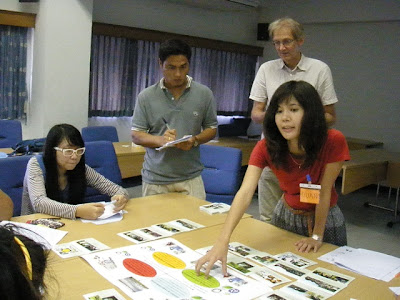Below is the status of some of the activities of SEAT project in Thailand:
1. LCA/LCC implementation (WP3) - still contacting potential tilapia and shrimp value chain actors to participate in the Life Cycle Assessment and Life Cycle Costing (LCA/LCC) of their operations. Main priority are the feed mills, processing plants and hatcheries. Secondary are the fish meal plants and reduction fisheries. A PhD student is also looking at by-products of processing plants, their current and potential re-use. LCA/LCC of growout farms have been completed and data entry is on-going (data translation prior to entry). Contacting potential respondents from the industry is a challenge. Those interested in this matter may contact us at seatku at gmail dot com.
 |
| Patrik H (PhD student, Leiden U) trained the local team and discussed about WP3 implementation |
2. Environmental modeling (WP4) - the first batch of samples (water, sediment, feed) had been sent for analysis, both in-country (water) and to the University of Stirling (sediment, feed). These are samples from selected shrimp and tilapia farmers contacted during the integrated survey.
 |
| Verifying farm map with farm manager |
3. Livelihoods survey (WP5) - already completed, and data entry in excel is complete, access database is still being finalised.
4. Perceptions on therapeutants selling and use (WP6) - data analysis of survey is ongoing, posters will be prepared for WAS conference in Sept. The probiotics study is on-going, while the FZT in tilapia study is nearing completion.
5. Environmental contamination (WP7) - microcosm studies already completed by Wageningen research partners in collaboration with SEAT-KU team; experiments on algal toxicity and kung foi genotoxicity on-going. Posters on results are being prepared for WAS conference.
 |
| Microcosm trials to assess the effect of antibiotics on ecosystem |
6. Ethical aquaculture workshop (WP8) - facilitated by the University of Bergen partners in collaboration with SEAT-KU team; representatives from various shrimp and tilapia value chain nodes have been invited and confirmations are being received, workshop materials are being prepared, including translations of presentation materials. Facilitators' training will be on 11-13 June, the workshop proper on 14 June, and post-workshop meeting on 15 June.
7. Action research (WP9) - out of a large number action research topics identified from scoping and integrated surveys, a couple have been identified as doable, namely: off-flavour in tilapia (building awareness among stakeholders esp producers, and on-farm trials on methods to reduce it), impact assessment of posters for information and knowledge across the value chains. Other initiatives related to engaging SMEs (in Thailand and Europe) to involve in action research, are on-going. Some if them are across the 4 country sites of the project, as well as across the different WPs.
 |
| Adding trash fish to shrimp feed to improve feed nutritional quality |



















































